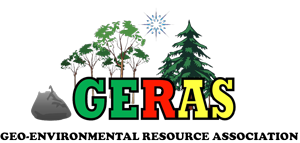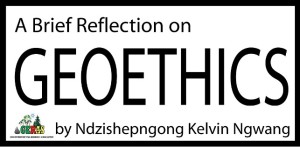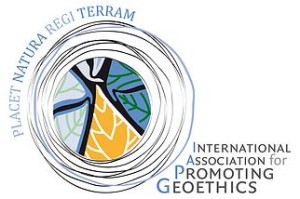A brief reflection on Geoethics
GERAS honors invitation from Denis & Lenora Foretia Foundation
December 4, 2015The Sustainable Development Goals: A time for Action by Everyone
March 21, 2016A brief reflection on Geoethics
A brief reflection on Geoethics
By Ndzishepngong Kelvin Ngwang
CEO, Geo-Environmental Resource Association (GERAS)
Email: ndzishepngong@gmail.com, Tel: +237 677354320
Abstract:
Geoethics represents an opportunity for Geoscientists to become more conscious of their social role and responsibilities in conducting their activity and is a tool to influence the awareness of society regarding problems related to geo-resources and geo-environment. The attention given to geoethics is still limited despite the importance of its themes. Only a few geoscientists make explicit reference to geoethics. Outside the scientific community, among the general public, no one even knows of geoethics. I got to know about Geoethics through social networking in December 2015, and I am sure that the geosciences members of my organization (GERAS) and the Cameroonian geosciences community may also be ignorant about this discipline. So, I decided to do a little research and present a brief reflection on geoethics as a means to help spread the word through our website and associated networks. You can also help spread the word farther by sharing on Facebook, Twitter, LinkedIn and Google+ etc.
Keywords: Geoethics, Planet, professional ethics, deontology, abiotic world, Geosciences, Geoscientists, geology, IAPG, Sustainable Development, geoparks, geo-tourism, geodiversity, geological heritage.
Introduction.
The earth is our unique home: our well-being and our survival depend on its habitability and resources (Matteucci et al., 2012). Furthermore, our Planet is not an immobile body; it has its own life in continuous evolution with processes that are often unavoidable and damaging for man. It is also evident that modifications of the earth system processes that are potentially damaging for humankind can be, and are being induced by man through actions that do not respect our Planet’s natural processes and equilibria. Problems that arise from the interaction between humans and nature are complex and may require various approaches and solutions. The possibility of multiple solutions and varied results creates a need for an open and widespread scientific discussion, on how to live on the planet while respecting natural dynamics and human life. This discussion inevitably raises ethical issues that force us to consider our responsibility in the interaction with nature (Peppoloni and Di Capua, 2015a).
Scientific definition of ethics.
Chalk et al., 1980 (in Martinez-Frias et al., 2011) scientifically define professional ethics as the principles defining the rights and responsibilities of scientists in their relationships with other scientists and with and with other people, including employers, researchers, clients, students etc. It is widely accepted that one of the main ethical approaches to decision making is Deontology; which refers to doing what is correct, meaning that many decisions are correct independently of their consequences (Martinez-Frias et al., 2011). It is one of those kinds of normative theories regarding which choices are morally required, forbidden, or permitted.
Background.
For many years, the growing impact of people on natural processes has been both recognized and documented. In 1873, the Italian geologist Antonio Stoppani (1824-1891) hypothesized and defined the “Anthropozoic era”, a geological time in which humans appear as a new “geologic force”. This is an era dominated by human activities, in many ways similar to the concept of the Anthropocene as defined by the Nobel Prize recipient Paul J. Crutzen (Crutzen, 2002). The Anthropocene refers to the time when human activities became capable of modifying the earth’s ecosystem and dynamics (Ellis and Haff, 2009).The scientific discipline of Geoethics has brought to the attention various topics of Earth Sciences needed to be discussed from a specific ethical point of view. Geoethical principles and geological factors are to be considered in any scenario of a “Sustainable Development”. To the originally preferred problems of protecting and moderating consumption of non-renewable mineral resources of the Earth, new priorities have been added, primarily concerning unavoidable natural disasters in connection with their presently increasing intensity. However, Geoethics as a discipline is not yet very well known (Martinez-Frias et al., 2011).
What is Geoethics?
Geoethics consists of research and reflection on those values upon which to base appropriate behavior and practice where human activities intersect with the geosphere (IAPG, 2012; Peppoloni and Di Capua, 2012b). It deals with the ethical, social, and cultural implications of geological research and practice, providing a point of intersection for geosciences, sociology and philosophy (Moores, 1997; Bosi et al., 2008; Peppoloni and Di Capua, 2012b; Peppoloni, 2012a, 2012b). The field of geosciences is wide. The Earth system is the subject of study, which includes the solid Earth, the hydrosphere, the atmosphere, and the biosphere (GSL, 2014). This implies that the themes of geoethics are numerous, often interconnected, and includes theoretical and practical aspects as well as cultural and operational perspectives. Geoethics focuses on some of the most important environmental emergencies: it encourages a critical analysis of the use of natural resources, promotes careful management of natural risks and foster the proper dissemination of the results of scientific studies, including the development of environmentally friendly technologies (Peppoloni and Di Carpua, 2012b), while also extending its principles to planetary protection (Martinez-Frias et al., 2011). Moreover, geoethics promotes geoeducation, aiming at organizing effective teaching tools (Bezzi, 1999), at developing awareness, values, and responsibility, especially amongst young people. It fosters the development of geoparks (Eder, 2004; Zouros, 2004; McKeever, 2013) and geo-tourism (Newsome and Dowling, 2010; Dowling, 2011), in order to create awareness of the value of a region’s geological heritage (Brocx and Semeniuk, 2007; Gray, 2008) and geodiversity (Osborne, 2000). Geoethics also aims at improving the relationship between the scientific community, decision makers, mass media, and the public (Hoppner et al., 2012), highlighting the social role played by geoscientists and their responsibilities; as their choices may have ethical, cultural, and economic repercussions on society (Peppoloni and Di Capua, 2012b; Bickford, 2013).In addition, the necessity of considering appropriate protocols, scientific integrity issues and a code of good practice regarding the study of the abiotic world is covered in this discipline.
Geoscientists and geoethics
Geosciences professionals’ duties go beyond scientific and technological knowledge and skills. The socio-cultural role played by geoscientists is essential (Peppoloni et al., 2015). Ethics is part of their professional responsibility. Geoscientists have relevant responsibilities towards society, from which in turn, the ethical importance of their action is derived. A correct and scientifically sound approach can mitigate or at least help to avoid many of the serious consequences that continue to arise through the irresponsible use of land by man. Even if Geologists have limited power to impose the correct choices on decision makers, their ethical obligation is to propose them and to report wrong actions and behavior. Even though Geoscientists possess the responsibility and extensive potential to apply their knowledge to the major challenges facing society and the planet, the discipline is ill-equipped to confront these issues beyond the lab (AGU, 2014). The issues of geoethics can no longer be ignored by the scientific community, and should become central to the scientific and cultural training of geoscientists (Peppoloni and Di Capua, 2015b).
The way forward for Geoethics in Cameroon.
Establishing a national section of The International Association for Promoting Geoethics (IAPG) will be a good way to promote GEOETHICS in Cameroon. The IAPG is a multidisciplinary, scientific platform for widening the debate on problems of Ethics applied to Geosciences. The IAPG is affiliated to the IUGS – International Union of Geological Sciences, is an International Associate Organization of the AGI – American Geosciences Institute and is an Associate Society of the GSA – Geological Society of America.
Further Reading
Publication page of the IAPG website.
References:
American Geophysical Union (2014): Spotlight on Scientific Integrity and Geoethics at the 2014 AGU Fall meeting. Eos, Vol. 95, No. 49, page 465.
Bezzi A. (1999). What is this thing called geosciences? Epistemological dimensions elicited with the repertory grid and their implications for scientific literacy. Science Education, 83, 6, pp 675 – 700.
Bickford M.E. (ed) (2013). The impact of the geological science on society. The geological society of America, Special Paper 501, pages 201, ISBN 978-0-8137-2501-7.
Bosi C., Peppoloni S., Piacente S. (2008). Philosophical and epistemological debate in Italy within an ethical perspective of Earth sciences. Proceedings of the 33rd International Geological Congress, Oslo, August 2008.
Brocx M. and Semeniuk V. (2007). Geoheritage and geoconservation – History, definition, scope and scale. Journal of the Royal Society of Western Australia, 90, 53 – 87.
Chalk R., Frankel M.S., and Chafer S.B., (1980): AAAS Professional Ethics Project. American Association for the Advancement of Science. 1515 Massachusetts Ave. NW, Washington D.C. 20005. AAAS Publication 80-R-4.
Crutzen P.J. (2002). Geology of mankind. Nature, 415,23.
Dowling R.K. (2011). Geotourism’s global growth. Geoheritage, 3, 1-13, doi 10.1007/s12371-010-0024-7.
Eder W. (2004). The global UNESCO network of geoparks. Proceedings of the First International Conference of Geoparks. Geological publishing House, Beijing.
Ellis E.C. and Haff P.K. (2009). Earth science in the Anthropocene: new epoch, new paradigm, new responsibilities. EOS Transactions, 90 (49): 473.
Gray M. (2008). Geoheritage 1. Geodiversity: a new paradigm for valuing and conserving geoheritage. Geoscience Canada, 35, 2, 51 – 59.
GSL (2014). Geology for society. A report by the Geological Society of London. January, https://www.geolsoc.org.uk/geology-for-society
Hoppner C., Whittle R., Brundle M. and Buchecker M. (2012). Linking social capacities and risk communication in Europe: a gap between theory and practice? Natural Hazards, 64, 1753 – 1778, doi 10.1007/s11069-012-0356-5.
IAPG (2012). Constitution of the International Association for Promoting Geoethics. https://www.iapg.geoethics.org/img/IAPG_Constitution.pdf Accessed on the 10th of December 2015.
Martinez-Frias J., Jose L.G., and Fernando R.P., (2011): Geoethics and deontology: From fundamentals to applications in Planetary Protection. Episodes Vol. 34, No. 4, 257-262.
Matteuci R., Guido G., Silva P., Sandra P., and Janusz W., (2012): A Hippocratic Oath for Geologists? ANALS OF GEOPHYSICS, 55, 3, 2012; doi: 10.4401/ag-5650.
McKeever P. (2013). Memory of the Earth. A world of science, Vol. 11, No 3, 4 – 13.
Moores E.M. (1997). Geology and Culture: a call for action. GSA TODAY, January, 7 – 11.
Newsome D. and Dowling R.K. (2010). Geotourism: The tourism of geology and landscape. Oxford: Goodfellow Publishers.
Osborne R.A.L. (2000). Geodiversity: “green” geology in action. Proceedings of the Linnean Society of New South wales, 122, 149 – 176.
Peppoloni S. (2012a). Ethical and cultural value of the Earth sciences. Interview with Prof. Giulio Giorello. Annals of Geophysics, Vol. 55, p. 343-346, ISSN: 2037-416X, doi: 10.4401/ag-5755
Peppoloni S. (2012b). Social aspects of the Earth sciences. Interview with Prof. Franco Ferrarotti. Annals of Geophysics, Vol. 55, p. 347-348, ISSN: 2037-416X, doi: 10.4401/ag-5632
Peppoloni S. and Di Capua G. (2015a). The meaning of Geoethics. In: Peppoloni S. and Wyss M. (editors): Geoethics: ethical challenges and case studies in Earth science. Elsevier, Waltham, Massachusetts, 2015, doi 10.1016/B978-0-12-799935-7.00001-0.
Peppoloni S. and Di Capua G. (2015b). Introduction. From: Peppoloni S. and Di Capua G. (eds) 2015. Geoethics: the Role and Responsibility of Geoscientists. Geological Society of London, Special Publications, 419, 1 – 4.
Peppoloni S., Bobrowsky P., Di Capua G. (2015). Geoethics: A challenge for Research Integrity in Geosciences, pp. 287-294, doi: 10.1142/9789814632393_0035. In: Steneck N., Anderson M., Kleinert S., Mayer T. (Eds). Integrity in the Global Research Arena. May 2015, 336 pp., World Scientific Publishing Co, ISBN: 978-981-4632-38-6.
Zouros N. (2004). The European Geoparks Networks – Geological heritage protection and local development. Episodes.



1 Comment
[…] Read a brief reflection on Geoethics through the link https://gerascameroon.org/a-brief-reflection-on-geoethics/ […]